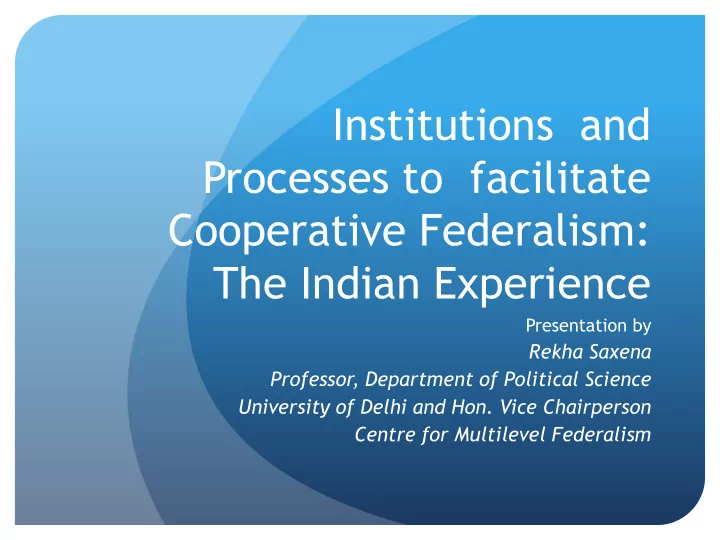

Institutions and Processes to facilitate Cooperative Federalism: The Indian Experience Presentation by Rekha Saxena Professor, Department of Political Science University of Delhi and Hon. Vice Chairperson Centre for Multilevel Federalism
Executive Mechanisms 1 Institutions set up under the Constitution( Article 263) : Inter- State Council (ISC) Institutions set up by Parliamentary Act : Five zonal councils under States Reorganization Act 1956 plus North-Eastern Council constituted in 1971 Institutions set up by cabinet resolution : National Development Council (NDC), Planning Commission (now replaced by NITI Ayog) Agreements between different orders of governments , e.g. MOUs National Integration Council: intergovernmental with wider scope Civil services especially federally-based All-India Services, a unique feature of the Indian federation
2 Legislative Mechanisms There are no formal or informal modes of cooperation between the legislatures of the Union and the states All-India conferences of speakers and presiding officers of the respective legislatures Most important legislative forum of intergovernmental significance is the Rajya Sabha Seats in Rajya Sabha are in proportion to the population of the state like in the popular chamber No house committee either in the parliament or state legislature with oversight on intergovernmental affairs
3 Other Mechanisms and Techniques Fi scal federal institutions : Finance Commission (Art.280) a constitutional body but not permanent, and Planning Commission ( 1950) a statutory body but permanent ( replaced by NITI Aayog in 2015) Union Agencies with Federal Implications : Election Commission, Union Public service Commission, Central Bureau of Investigation , Central Auditor General of India, National Investigative Agency, paramilitary forces Independent Regulatory Authorities in national economy in post-liberalization phase in various sectors like telecom , electricity, banking, insurance, companies affairs : Telecom Regulatory Authority of India (TRAI), Central Electricity Regulatory Commission (CERC), Securities Exchange Board of India (SEBI), Competition Commission Tribunals set up under Inter State River Water Disputes Act 1956 resolve water disputes : Narmada, Krishna, Godavari, Cauvery, Sutlej-Yamuna and environmental issues( National Green Tribunal ), and Constitutional Courts
4 Recommendations of Various Commissions on union-state relations Sarkaria Commission set up in 1983 M.M Punchhi Commission set up in 2007 Sarkaria recommended the setting up of Inter State Council Emphasis of both these commissions have been on promoting cooperative federalism based on mutual trust and consultation in the Inter State Council Punchhi Commission recommended equal representation of states in Rajya Sabha and empowering its committees for parliamentary oversight on union – state and inter-state relations
5 XIV Finance Commission Report Recommendations on cooperative Federalism To evolve new institutional arrangement consistent with the objective of Cooperative federalism for larger role envisaged for the Inter-State Council 1. Identifying sectors in states eligible for grants from union (states’ share in net proceeds of tax revenue increased to 42% from 32%) 2. Indicating criteria for inter-state distribution 3. Help design schemes with flexibility for states regarding implementation 4. Identifying and providing area-specific grants 5. New institutional arrangement should become the forum for integrating economic and environmental concerns in decision-making
Recommend
More recommend